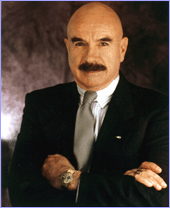
Dear Dr. Hurd:
How would you recommend overcoming a fear of something? What steps should you take to combat a phobia?
And should you do something as extreme as what G. Gordon Liddy said he did as a youth to overcome his fear of rats–cooking one and eating it–and his fear of lightning storms–tying himself to a tree in the middle of one? Did G. Gordon Liddy have the right idea about phobias?
I have a fear of heights. I can get on a plane and I enjoy flying. I can go up to the “sky lounge” of any skyscraper and look out the window. But I can’t bring myself to cross a local bridge which most people can cross without hesitation (I said most; I’ve heard there are a few who are afraid even to drive over it).
I’d like to conquer this fear; I just wish I knew how.
Dr. Hurd’s reply:
One major component of overcoming fear is determination.
G. Gordon Liddy, in that example you gave, was committed. Based on how he recounts it, he was deeply committed to not letting fear rule his life from a very early age. Did he need to eat a rat to survive? Of course not. He didn’t cook and eat the rat because he needed it; he did it because he was deeply determined to not letting fear rule his life, not in any way.
The number one principle of fear reduction is to embrace the thing you avoid. Where most people go wrong is they say, ‘I will tell myself what’s irrational or mistaken about the fear.’ Well, that’s certainly necessary. But that’s rarely enough.
Don’t make the wrong thing your goal. Your goal cannot and should not be to eradicate the fear. Your goal, like I said, should be to embrace the thing you dread. See it as connected to something useful, worthwhile and valuable about your life.
Apparently you did that with heights. You didn’t mention that you completely eradicated a fear of heights from your psyche. I doubt that you did, and I know it was never necessary. What you did was reaffirm how important certain things are to your life. Enjoying the view from a skyscraper, for example. Or taking a trip by airplane, getting where you wish to go. You embraced these things, because despite the fear they are important to you.
If you did it with heights and flying, you can do it with your local bridge. I know you believe you can’t, but first you must leave room for the possibility that you can.
Once you do that, then take action. Do whatever you have to do to get yourself across that bridge—again, again and again. Do not wait for the fear to go away, or even to reduce, before you go over that bridge. Focus on what waits for you across the bridge. I don’t mean the buildings, businesses or homes there. I mean how you will feel about yourself having done this. Think G. Gordon Liddy and the rat. It wasn’t about eating a rat. It was about conquering fear, for its own sake. Isn’t that a valuable and worthwhile thing?
You probably value taking an airplane trip or spending time in a skyscraper more than you value whatever you have to do on the other side of that bridge. I don’t doubt there are other ways to get there, without using the bridge, and as a result you avoid the bridge, on principle.
It’s time to reverse the principle, so you can be proud of yourself.
This column is not intended to give anyone the techniques for eradicating a fear, the way you’d erase a file from your computer (including the recycle bin). Like I said: that isn’t the right goal.
The right goal is expanding your capacity for coping and living—living fully, that is. It isn’t about the bridge. It’s about being the kind of person you’d like to be. That person will drive over the bridge, and do just fine. It’s the avoidance that’s making you down about yourself, and it’s avoidance that makes you more afraid.
That’s why the crucial thing is to reverse your course psychologically and embrace that which you dread. It’s not something you’ll achieve by following a series of cookbook-like steps; you’ll achieve it only by deciding to achieve it.
Be sure to “friend” Dr. Hurd on Facebook. Search under “Michael Hurd” (Rehoboth Beach DE). Get up-to-the-minute postings, recommended articles and links, and engage in back-and-forth discussion with Dr. Hurd on topics of interest.
